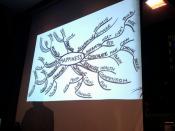"Don't worry; be happy." This phrase is often used as a positive bit of advice to lift one's spirits and cast troublesome worries aside. Who would want to live life constantly in stress and grief caused by ceaseless worrying? Living one's life that way would make no sense, especially when humans, according to Epicurus, seek happiness and only have this life to achieve that goal. A reflection of Epicurus' beliefs can be seen in the simplified motto of "don't worry; be happy." Such a reflection can be drawn from an overview of Epicurus' beliefs; this being simply to put away worries, specifically concerning death, and live this life in true happiness.
In pursuit of "the happy life," Epicurus leads one to make the claim that:
1. Pleasure is the motive of human action and the first, natural, and greatest good.
Unlike Socrates, who felt that being good was foremost and would in turn bring the feeling of good or reward of good in the afterlife, Epicurus felt that people seek to feel good in this life and this feeling of good can come through acting in goodness.
According to Epicurus, one should seek, by nature, pleasure in this life. The pleasures sought can be classified characteristically based on need. Some pleasures we seek because they are natural and necessary. These pleasures can be things such as the physical dependencies of food, water, and sleep. Epicurus views the satisfaction of such physical needs as a pleasurable experience and not as being a hindrance to happiness as a Socratic view would hold. While satisfaction of these pleasures brings happiness, it is understood that they can only increase in quality, not quantity. Hunger, therefore, is satisfied by a rationally proportioned amount of perhaps bread and water, but...


